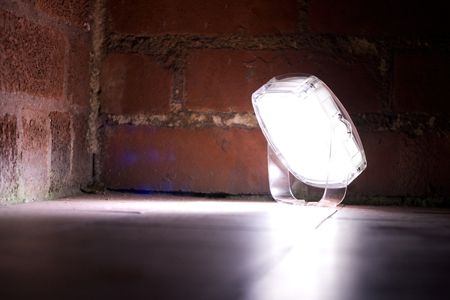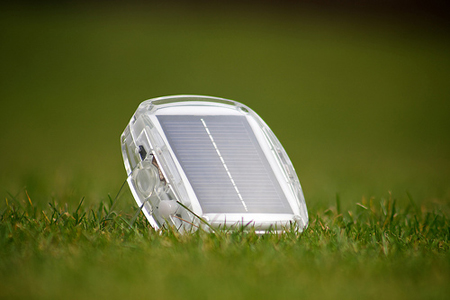Every once in awhile a product idea really grabs us and those of you who read all of the great green technology we cover here at EarthTechling. Last Friday we became aware of the Solar Pebble, an innovative and inexpensive little solar charger and LED light said to be equally at home in rural Africa or urban London by its designers Plus Minus Design. We put up a little story about it as we do with most everything else and went home for the weekend. This little story quickly caught fire, drawing a lot of readers and positive feedback over the weekend.
We reached out to Plus Minus Design as a result to find out more about what this small design firm is up to with the Solar Pebble and what makes them tick. Design director Adam Robinson responded back to our questions about the Pebble and his outfit’s humanitarian plans for this soon to be released product. We are proud to bring you his responses here.

EarthTechling: Tell us a little about Plus Minus Design. What is the focus of your group?
Adam Robinson: Plus Minus Design Is an eco-product-design consultancy based in Leeds, UK. We offer a fresh design approach, aiming to improve on the social and environmental credentials of all products we create, whilst providing genuine business incentives such as increased market share, sales and profits, and minimised costs of waste and inefficiency.
We are all extremely passionate about design and also the moral obligation of designers to help businesses and consumers make better choices, by simply providing better options. We don’t believe for a second, that anybody in the world wants to cause a negative impact, however we also believe that consumerism is so closely tied to global economics and lifestyles that our buying habits are unlikely to change in the foreseeable future.
This brings us to our design ethos – more of the same but better! Lifestyles will enviably need to change to become more sustainable, however this will be a very slow process. In the mean time we aim to reduce the impact of everyday objects as far as possible, with what options we have today.
ET: Talk about your previous solar-focused projects. What were you hoping to achieve in designing them?
Robinson: Whilst studying a Masters of Design at the University of Leeds, myself and a fellow director in Plus Minus Design, Henry James, had the opportunity of working along side SolarAid, a UK based charity, to research, design and develop a simple solar powered alternative to the kerosene burning lanterns current used in rural Africa.
Kerosene is both extremely dangerous, killing many people everyday in developing nations, and extremely expensive. The aim of the product was to provide a cheaper, safer alternative for lighting, to aid in daily tasks and education.
This project was very successful, resulting in a product called the SolarOrb and the findings being published in several journals. (More information available here). Due to constraints however, SolarAid were unable to take the product on.
ET: What exactly is the Solar Pebble, in your words?
Robinson: After parting ways with SolarAid our team remained extremely passionate about the cause, and personally vowed to take on the project for continued development and eventual launch. Six months later this lead us to the Solar Pebble!
The Solar Pebble is a very simple design heavily driven by functionality, aesthetics and costs. Functionally the product can be charged during the day to provide high quality lighting in the evening and can also power mobile phones, MP3 players and radios. Aesthetically we believe the product looks great, finally taking the lantern market way from that all too common “lantern look” and is something users can be proud to own. Most importantly we can provide these lanterns at cost value to people in Uganda for just £5 with our operations supported by sales in Western markets.
Eventually we would love to generate enough profit in Western markets not only to support our daily business operations but also to start subsiding the products in African markets to reduce this cost even further, and to reinvest in developing the new humanitarian products. We have our eyes on a water purifier next!

ET: How do you feel envision the Solar Pebble as being a useful device for people in rural, developing parts of the world like parts of Africa?
Robinson: The Solar Pebble was developed from eight months research into the target user lifestyles and daily tasks in rural Africa and the product has been specifically designed to address these needs in a cost efficient manner.
Specifically the following core benefits can be identified:
- The solar powered charging unit takes advantage of a consistent 12 hours of sunlight and aligns with the outdoor working lifestyles. The efficiency of the panel allows for an approximate 1 hour charging to 2 hours lighting on low settings or 45 minuets of lighting on high settings.
- The lighting function of the product provides users not only tremendous health benefits of being able to avoid burning kerosene, but also offers a significant annual household saving.
- The ability to charge mobile phones is very important, as currently the majority of people own mobile phones, however have to travel great distances to local charging shops and pay to charge their phones.
- Finally the product is designed to be assembled in rural African locations. We aim to have a group of trainers moving from community to community setting up local business that can order, assembly and sell on the pebble to not only benefit users, but develop and sustain local economies.
In addition to its primary benefits the pebble offers the further added value benefits of:
- Small, portable size for easy transportation during the day.
- Built in strap holes for attaching to bikes and bags.
- Rugged design for long lasting reliability.
- Rain proof to avoid damage if left out during sudden heavy rain experience in the rain season.
- Dust proof to avoid damage in hot dry conditions.
- Multi-positional handle to aid in various use scenarios.
- Handle doubles as a desk lamp stand for focused tasks such as reading and writing.
ET: Are there actual plans to bring the Solar Pebble to retail? What will be the details around this if so?
Robinson: Yes everyone will be happy to know we are not just talking the talk. We are currently in the later stages of negotiations with manufacturers and business planning with the aim of launching the product in both Uganda and the UK by mid summer.
We have established relationships with a variety of organizations working in Uganda and aim to put a full time representative on the ground immediately. In the UK you can look out for the Pebble appearing in shops soon and help us to reach more people by buying and enjoying the product at home in the garden, at festivals and out camping.
In the mean time please feel free to follow our development and sign up for updates on Facebook.